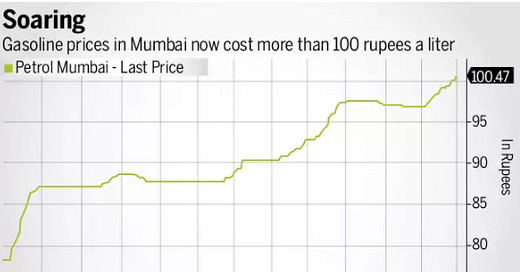Small Oil | Learning by Proxy
The blows are coming from within this time around, this is going to be harder to overcome!
Learning by Proxy is a weekly newsletter that covers things happening around the world, along with some context that helps you understand it better. This is the 62nd edition of the newsletter.
The bigger any industry has grown, the more they have been able to influence policy to have it their way. But what can they do when the push for change comes from those who own the company. When the current operations do not seem sustainable over the long term and questions based only on shareholder returns arise, it is something they cannot lobby their way out of.
Small Oil
From the perspective of activists - Big "industry name" - usually refers to an industry that has grown big and is colluding to paint an untrue picture about itself. Think Big Tobacco, Big Pharma, there should have been Big Cereals also but unfortunately is not but more recently, Big-Tech.
This one is about Big Oil and how the deflation seems to have started. But first,
Exxon was aware of climate change, as early as 1977, 11 years before it became a public issue, according to a recent investigation from InsideClimate News. This knowledge did not prevent the company (now ExxonMobil and the world’s largest oil and gas company) from spending decades refusing to publicly acknowledge climate change and even promoting climate misinformation—an approach many have likened to the lies spread by the tobacco industry regarding the health risks of smoking. Both industries were conscious that their products wouldn’t stay profitable once the world understood the risks, so much so that they used the same consultants to develop strategies on how to communicate with the public.
Source: Scientific American
There were decades when the ill-effects of pollution could have been arrested but lobbyists from companies such as Exxon bought and sold Senators and House representatives with money as well as threats of job loss in their constituencies. This is not called corruption, it is just convincing using money!
Safe to say, the cat is out of the bag. Half of the immigration crisis on the planet from Sudan to Guatemala is a result of climate having inflicted irreparable harm to agriculture. People have no means of earning a living and this fuels backlash against the government and eventual migration in the hope of a better life.
The oil business is run by cartels and each continent has a handful of companies that monopolise the supply. This week, they got punched in the nose with a promise of a few more punches coming.
A court in the Hague has ordered Royal Dutch Shell to cut its global carbon emissions by 45% by the end of 2030 compared to 2019 levels, in a landmark case brought by Friends of the Earth and over 17,000 co-plaintiffs.
The oil giant’s sustainability policy was found to be insufficiently “concrete” by the Dutch court in an unprecedented ruling that will have wide implications for the industry.
The Anglo-Dutch company was said to have a duty of care to reduce emissions, and told that its plans should be brought into line with the Paris climate agreement.
[...]
The company had raised its targets in April to reduce its relative CO2 emissions by 30% by 2035, and by 65% by 2050 compared with 2016.
But lawyers for the plaintiffs successfully argued that these targets were insufficient, as such relative changes could be achieved simply by investing in renewables at the same time as expanding fossil fuel investment.
[...]
Roger Cox, lawyer for Friends of the Earth Netherlands, said: “This is a turning point in history. This case is unique because it is the first time a judge has ordered a large polluting corporation to comply with the Paris climate agreement. This ruling may also have major consequences for other big polluters.”
Source: Guardian
Royal Dutch Shell was a company that was formed as a result of a merger between an English and a Dutch company back in 1907. Today, they are one of the largest players in petroleum. They have been navigating the climate conversation through disinformation as well as heavy lobbying. With most European countries having committed to moving towards sustainability, this is the first major pushback.
The fact that the court has thrown the Paris Agreement in their face is also very significant because this makes the agreement a far more serious undertaking.
If you asked someone; what is Engine No. 1? - they would probably ask you if it was the first steam engine. It is a small hedge fund that is based in America with only $ 250 Million in net assets under management. By Hedge fund standards this is a very small amount.
An activist investor is one that takes a shareholding in a company and then uses that shareholding to voice opinions about what the company should be doing to other shareholders. Engine No. 1 is an activist shareholder.
ExxonMobil a company that was born out of the merger of two entities that were created after Standard Oil of the Rockefeller fame was broken apart by the Sherman Act; was at the receiving end.
Till a few years ago, Exxon was the most valued company in America.
Looking back, it can almost seem as if Engine No. 1 was set up expressly to effect these changes in ExxonMobil’s board. Ever since it was founded in December, Engine No. 1 has been calling on ExxonMobil’s shareholders to “Reenergize Exxon”—the name of its campaign, complete with slick web site. The fund’s arguments were strategic rather than ideological: that the company’s returns have been consistently disappointing shareholders over the last 10 years, and that it needed fresh direction in a rapidly decarbonizing world.
The past decade saw ExxonMobil’s total shareholder returns—dividends included—languish at -15%, compared to the 271% return the S&P 500 provided. Sticking to oil and gas, and not exploring clean energy alternatives, was an “existential risk” for ExxonMobil, Engine No. 1 argued. (Engine No. 1 did not respond to a request for comment.) On Dec. 7, the hedge fund sent ExxonMobil a letter listing its four nominees for the board. “It is time,” the fund wrote in the letter, “for shareholders to weigh in.”
Source: Quartz
The beauty is that Engine No. 1 got 2 seats on the board and could soon have 3 seats on the board. Their argument has been that the current board is doing a shoddy job of providing returns to shareholders. They appealed to the money as they must, rather than making this an ideological fight.
Chevron’s shareholders voted to tell the company to reduce not only its own emissions, but also, remarkably, the emissions produced by customers who burn its oil and gasoline. And in Australia, a judge warned the government that a proposed coal mine expansion, a project challenged by eight teenagers and an 86-year-old nun, would need to ensure that it wouldn’t harm the health of the country’s children.
Source: New York Times
This One-Two-Three gut-punch across the globe is a significant point to be noted.
First of all the activism or pushback is not coming from one continent alone.
Second of all, it is coming at a time when climate activism is going up and the consequences of it are getting harder and harder to ignore. Australia and Western America have the fire season. South-Eastern America has the hurricane season. Not to mention the summer deaths that peak in the Mediterranean every year caused by the heat.
Thirdly it is going to cause many shareholders to rethink their portfolios. If the pension funds get spooked and start moving their monies, these companies will see a huge hit to their value.
Retail Shareholders
If you look at the shareholding pattern of a typical large company, what you will find is that the largest shareholders are funds. These could be hedge funds, pension funds and other such pooled money. Then you have the promoters. While it is rare for a promoter to also be a majority shareholder of a publicly-held company, it is not impossible. Also, there are many companies where the promoter is the single largest shareholder of the company. Finally, there are retail investors who are individuals like you and I, who tend to buy a small number of shares with our savings. Such shareholders are called retail shareholders.
While the ownership of each retail shareholder is minuscule, when you start to pool it all together, it can represent a huge chunk. Say a 100,000 shareholder each own a few thousand shares. When you put it together, it can represent hundreds of millions of shares and sometimes to the tune of 30% of the company. Get a few funds that own 5% of the company on your side and you can make change happen.
But how do you align 100,000 shareholders?
Turns out there’s an app for that. These days it’s as easy for retail shareholders to vote on CEO compensation as it is to order sushi on DoorDash. Just as brokerage apps have democratized investing, making stock and derivatives trading painlessly easy for everyday investors, so too has shareholder voting become almost effortless.
Armchair traders are a big constituency: Individual investors account for about a quarter of the US equity market, up from just 10% two years ago, according to Goldman Sachs. They, like everyone who owns stock in public companies, get to vote on things like board elections, auditors, climate change proposals—and executive compensation.
That means millions of regular people are a few phone taps away from taking a stand against CEOs getting paid around 320-times that of the median for their employees. Shareholder votes have traditionally been mind-numbingly boring, requiring people go through dense paper documentation that typically goes in the garbage. But financial apps like Acorns, Square’s Cash App, SoFi, and Stake use technology from Say, an investor communications platform, which lets you vote on multi-million-dollar executive compensation in just a few seconds. Robinhood, the app that’s synonymous with the retail trading boom, uses a company called Mediant, which offers “one-click” voting.
Source: Quartz
In recent times, fed up with the market fixing of the hedge funds, retail investors have been aligning behind shares of various companies such as GameStop to push the share price from their end. While that is speculative and intended to hurt the funds that are shorting the shares, the retail investors are beginning to realise that those same powers can be wielded to do good.
They are going after the disproportionately high executive pay in various companies. Much like the hurt that ExxonMobil is now required to deal with, if these people are able to bring about changes at the board level, it can have lasting consequences on executive pay.
They don't need to straighten out every company. Just cause hurt at some of the largest companies through activism and they would have managed to sound the bugle. It can force a change in how boards start viewing executive pay.
Exciting times ahead!!
Modi's Gift to the World
Last year began with China getting ravaged by COVID and just as it seemed like China was getting things back in control, the rest of the world got ravaged. 2020 was a year that was lost for all practical purposes. As 2020 came to an end, it seemed like things were going to get back to normal. With the ousting of Donald Trump, it seemed like even the US could make it out and it did.
Then Donald Trump's slightly more evil twin in India in his all-out commitment to winning the West Bengal state elections and undying commitment to Hindutva unleashed a Tsunami. There is not a district in India that was left unscathed. And in the process, we gave birth to B.1.617.2.
India was going into lockdown as the UK was coming out of it. Then an Indian delegation went to the UK quite probably bearing the gift of B.1.617.2. And now...
The 21 June target for scrapping England’s remaining coronavirus restrictions appears increasingly under threat, as a senior government adviser said the country was in the early stages of a third wave.
Prof Ravi Gupta, a member of the New and Emerging Respiratory Virus Threats Advisory Group (Nervtag), told BBC Radio 4’s Today programme there had been “exponential growth” in new cases, with the variant first detected in India accounting for three-quarters.
Source: Guardian
And then Vietnam detected the love child of the Indian and British variant in their country.
"Vietnam has uncovered a new COVID-19 variant combining characteristics of the two existing variants first found in India and the U.K.," Health Minister Nguyen Thanh Long said, according to Reuters. "That the new one is an Indian variant with mutations that originally belong to the U.K. variant is very dangerous."
Source: NPR
Unlike India, let us hope that sanity prevails elsewhere and they do go into lockdown at the earliest and cull the spread of the virus. It will take only a matter of weeks before this virus is halfway around the world causing havoc.
The Japanese insistence to push on with the Olympics and the American guidance to drop masks altogether are the kind of moves you do not want to see under such circumstances.
China in the meantime has a new gift for the world.
A 41-year-old man in China’s eastern Jiangsu Province is the first known human to be infected with a strain of bird flu known as H10N3, China’s National Health Commission said on Tuesday — a development that experts said merited close monitoring because of an underlying continued risk of pandemic flus.
Avian viruses do not typically spread among humans, but they can pose a danger to humans if they mix with a human virus, said Raina MacIntyre, the head of the biosecurity program at the Kirby Institute at the University of New South Wales in Australia.
“If someone has human flu and is infected with bird flu, the two viruses can swap genetic material,” she said. “That’s why you see the concern for pandemic flu arising in countries where humans and livestock have very close contact.”
Source: New York Times
The time to send a WHO team to investigate is now! Not 18 months later.
Also
Achche Din!
Brazilians have had it!
Have you seen juggling from above?
Can't watch this enough!
Tumbleweed Words is a literary newsletter of contemporary prose and poetry. Read Here
Also, follow me on Twitter @viveksrn to know when the newsletter drops.
What we think, we become ~ Buddha












Robinhood?? Liked the name and purpose of it. Do we have such thing in India??